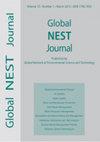THE ROLE OF EPOXIDATION ON CAMELINA Sativa BIODIESEL PROPERTIES
IF 1.2
4区 环境科学与生态学
Q4 ENVIRONMENTAL SCIENCES
引用次数: 3
Abstract
An unstandarised biodiesel made from Camelina sativa oil, having over a 90 percent by weight of unsaturated fatty acids, were transformed into an epoxidised biodiesel that satisfy the requirements for iodine value, linolenic acid methyl ester content, cetane number, polyunsaturated fatty acids content, and viscosity established by the EN 14214 and ASTM D 6751 standards. The epoxidation reaction was carried out at 60 °C using peroxyacetic acid generated in situ and sulphuric acid as catalyst. A conversion of 60 % of double bonds was reached after 3 hours of reaction. However, only one hour was needed to get standard requirements and to avoid the epoxide ring opening side reaction that leads to hydroxyl groups. Besides, it was also observed that the formation of hydroxyl groups increases the kinematic viscosity of the biodiesel, being deleterious for the biodiesel properties.环氧化对亚麻荠生物柴油性能的影响
由含有超过90%重量不饱和脂肪酸的亚麻荠籽油制成的未标准化生物柴油,转化为满足EN 14214和ASTM D 6751标准规定的碘值、亚麻酸甲酯含量、十六烷值、多不饱和脂肪酸含量和粘度要求的环氧化生物柴油。以硫酸为催化剂,原位生成过氧乙酸,在60℃条件下进行环氧化反应。反应3小时后,双键转化率达60%。然而,只需要一个小时就能达到标准要求,并避免导致羟基的环氧化物开环副反应。此外,还观察到羟基的形成增加了生物柴油的运动粘度,对生物柴油的性能有害。
本文章由计算机程序翻译,如有差异,请以英文原文为准。
求助全文
约1分钟内获得全文
求助全文
来源期刊

Global Nest Journal
环境科学-环境科学
CiteScore
1.50
自引率
9.10%
发文量
100
审稿时长
>12 weeks
期刊介绍:
Global Network of Environmental Science and Technology Journal (Global NEST Journal) is a scientific source of information for professionals in a wide range of environmental disciplines. The Journal is published both in print and online.
Global NEST Journal constitutes an international effort of scientists, technologists, engineers and other interested groups involved in all scientific and technological aspects of the environment, as well, as in application techniques aiming at the development of sustainable solutions. Its main target is to support and assist the dissemination of information regarding the most contemporary methods for improving quality of life through the development and application of technologies and policies friendly to the environment
 求助内容:
求助内容: 应助结果提醒方式:
应助结果提醒方式:


